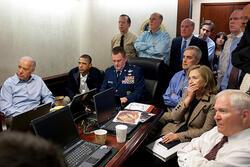Prophets, Politics, and the Modern Girl
Hillary Clinton is giving me an identity crisis. When I watch her take the stage at a political event, I’m filled with a mix of emotions: pride and joy that the first female presidential candidate is also the most qualified one; empathy when I consider the hardships she has faced as a woman in politics; reassurance when I feel confident that our next leader won’t be an orange-hued toddler in a suit. There is also some revulsion when I think about the choices Hillary has made that I find unconscionable. My overarching emotion, however, is a strong sense of confusion about how I fit into our political system.
My high school principal once told me that, to a certain extent, if we want to make change in the world, we all have to decide whether we are going to be prophets or politicians. Do we work within the system to create equity, or dismantle it completely? Are we advocating for, say, equal pay for women from a CEO’s office like Sheryl Sandberg, or doing guerilla performance art like Pussy Riot? I think about this question almost daily.
Hillary is, as President Obama said at the Democratic National Convention, the most qualified presidential candidate this country has seen. In her lifelong political career, she’s climbed every ladder and fought her way to the top in spite of the misogyny she faces every day. In many ways, she’s a total badass. But she’s not quite the champion that progressives want–she’s too centrist, too friendly with Wall Street and has a murky history of racist rhetoric. As much as I was inspired, and excited, by her DNC speech, I kept wishing she would say that black lives matter. I wanted her to convince me that she cares about all women, not just white cisgender ones. Instead, her recent tactic has been to play it safe–and I don’t really blame her.
Even if she was more radical in her liberalism, she would still be forced to make difficult choices while in office. The President is, after all, also the Commander in Chief.
Hillary has to be a realist, not an idealist. She is not a prophet, she’s a politician. My own leftist idealism might be tempered as I age, but right now the thought of surrendering my moral compass for power feels incomprehensibly wrong. I think about alternative role models, the women revolutionaries I admire: Audre Lorde, Gloria Steinem, Angela Davis, Frida Kahlo. They decided to forego the system–perhaps a natural choice, as the system was not created for them–and strike out on their own to make a difference. Were they effective? Yes. Did they suffer? Yes.
I don’t know that I’m brave enough to suffer without an institution to fall back on.
Maybe politicians sacrifice authenticity for popularity, and prophets sacrifice efficacy for moral purity. Maybe politicians choose their paychecks over their values and prophets choose radicalness over relatability. Maybe politicians are too quick to resort to “business as usual.” Maybe prophets are too quick to isolate themselves.
I suppose my personal question of prophet vs. politician is one that will be answered as I age and begin to find my calling and place in the world. Part of growing up, it seems, is letting go of the idea that you can reach all of your potentials. Sacrificing this idea, of an open-ended number of future versions of yourself, is difficult, but being able to focus and put your whole heart into your work is full of a different kind of promise.
Both prophets and politicians contribute to making the world a more equitable and harmonious place, and in many ways, these two types of changemakers work synergistically: for example, the Civil Rights Act would not have been written without the work of activists, and their work would not have led to lasting change without the support of politicians. I hope that as a generation of young women grow up under the leadership of our first female president, they become both Hillary Clintons and Angela Davis-es, Ruth Bader Ginsbergs and Emma Goldmans. I hope we have intelligent, compassionate women shaping our world from within institutions and other intelligent and compassionate women protesting outside the door.








Wow - this is one of the most insightful and helpful essays I've read about HRC and progressive politics. Thank you!